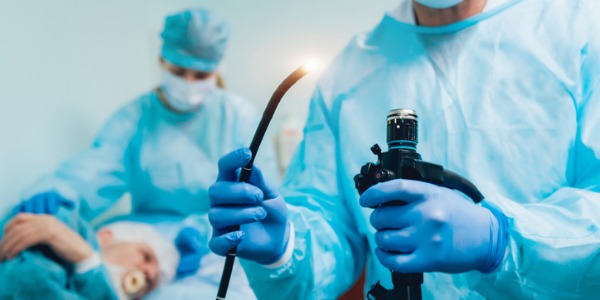What is an Endoscopy Technician?
Endoscopy technicians work closely with physicians, nurses, and other medical staff to ensure the efficient and safe use of endoscopes, which are instruments equipped with cameras and lights used to visualize internal organs and structures. The work of endoscopy technicians contributes to the overall effectiveness of endoscopic examinations and ensures a smooth workflow in healthcare settings where these procedures are performed.
What does an Endoscopy Technician do?

Duties and Responsibilities
Endoscopy technicians have a range of duties and responsibilities that revolve around supporting medical professionals during endoscopic procedures. Here are the key responsibilities of an endoscopy technician:
- Equipment Preparation: Sterilize, assemble, and set up endoscopic equipment before procedures. Ensure that all instruments, including endoscopes and accessories, are in proper working condition.
- Procedural Support: Assist physicians, nurses, and other healthcare professionals during endoscopic examinations and procedures. Hand instruments to the medical team, adjust equipment as needed, and anticipate the requirements of the procedure.
- Patient Preparation: Prepare and position patients for endoscopic procedures, providing comfort and reassurance. Verify patient information, explain the procedure, and address any questions or concerns.
- Cleaning and Disinfection: Clean and disinfect endoscopic equipment and instruments after each use, following established protocols and infection control guidelines. Ensure compliance with safety and hygiene standards to prevent the risk of infections.
- Documentation: Maintain accurate and detailed records of procedures, equipment usage, and patient information. Document any issues or complications that arise during procedures.
- Inventory Management: Monitor and manage inventory of endoscopic supplies and accessories. Order, restock, and organize supplies to ensure that the necessary items are readily available.
- Quality Control: Participate in quality control and assurance activities to maintain the highest standards in endoscopy services. Report any equipment malfunctions or deviations from established protocols.
- Patient Care: Provide post-procedure care and instructions to patients. Monitor patients for any adverse reactions or complications and report findings to the healthcare team.
- Communication: Communicate effectively with the healthcare team, patients, and other staff members. Collaborate with physicians and nurses to ensure a coordinated and efficient workflow.
Types of Endoscopy Technicians
In the field of endoscopy, technicians may specialize in various roles based on their expertise, experience, and the specific requirements of the healthcare settings they work in. While the titles may vary, here are some types of endoscopy technicians:
- Gastrointestinal (GI) Endoscopy Technician: Specializing in gastrointestinal endoscopy, these technicians focus on procedures related to the digestive system, including esophagogastroduodenoscopy (EGD) and colonoscopy.
- Bronchoscopy Technician: Bronchoscopy technicians specialize in assisting with procedures that involve the examination of the bronchial tubes and lungs using a bronchoscope. This is often used in pulmonary and respiratory care.
- Urology Endoscopy Technician: Working in urology departments, these technicians assist with endoscopic procedures related to the urinary system, such as cystoscopy.
- ENT (Ear, Nose, and Throat) Endoscopy Technician: Specializing in otolaryngology, these technicians assist with endoscopic examinations and procedures involving the ear, nose, and throat.
- Surgical Endoscopy Technician: Working closely with surgical teams, surgical endoscopy technicians specialize in endoscopic procedures performed during surgeries, often in operating rooms.
- Pediatric Endoscopy Technician: Specializing in pediatric care, these technicians focus on assisting with endoscopic procedures for children, considering the unique needs and challenges of pediatric patients.
- Flexible Endoscope Reprocessing Technician: With a focus on infection control and equipment maintenance, these technicians specialize in cleaning, disinfecting, and reprocessing flexible endoscopes to ensure compliance with hygiene standards.
- Veterinary Endoscopy Technician: In veterinary medicine, technicians may specialize in assisting with endoscopic procedures for animals, contributing to veterinary diagnostic and treatment processes.
What is the workplace of an Endoscopy Technician like?
Endoscopy technicians typically work in medical facilities such as hospitals, ambulatory surgical centers, specialty clinics, and endoscopy centers. The workplace of an endoscopy technician is characterized by a dynamic and collaborative environment centered around the performance of endoscopic procedures. These professionals are an integral part of the healthcare team, working alongside physicians, nurses, and other medical staff to ensure the smooth execution of endoscopic examinations.
The primary workspace for endoscopy technicians is the endoscopy suite, where various endoscopic procedures are conducted. This suite is equipped with advanced endoscopic equipment, monitors, and sterile instruments. The technician is responsible for preparing the examination room, ensuring that all instruments are sterilized and functioning correctly, and assisting with patient preparation. The fast-paced nature of the endoscopy suite requires technicians to be adept at multitasking and responding promptly to the needs of the medical team and patients.
In addition to the endoscopy suite, endoscopy technicians may also work in sterilization and reprocessing areas where they clean, disinfect, and sterilize endoscopic instruments between procedures. Some technicians may be involved in inventory management, ensuring that necessary supplies and equipment are readily available. Given the critical role of endoscopy technicians in maintaining a sterile and efficient environment, their work contributes directly to the delivery of high-quality patient care in gastroenterology, pulmonology, urology, and other medical specialties that utilize endoscopic procedures.